Movies We Like
Handpicked By The Amoeba Staff
Films selected and reviewed by discerning movie buffs, television junkies, and documentary diehards (a.k.a. our staff).
Plan 9 From Outer Space
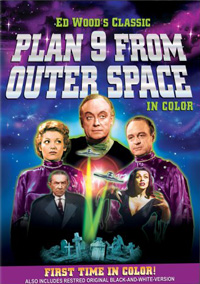 In the world of bad movies, most are boring and just unwatchable - lazy filmmakers just trying to slap something together to make a buck or ambitious filmmakers overreaching and missing, big time. Every once in a while a movie comes along that splits the difference and is so bad it becomes a wonderful experience. Director Edward D. Wood Jr.’s now legendary would be sci-fi flick Plan 9 From Outer Space has become the Citizen Kane of bad, so amazingly inept, yet so innocently earnest and good-natured that it’s not hard to kind of love it. Literally every scene in its 79 minutes is filled with amazingly laugh-out loud, quotable dialogue, horrible acting, ridiculous special effects and utterly inane directing. Ben Hur might have won the Best Picture Oscar in 1959, but Plan 9 From Outer Space is way more memorable and special.
In the world of bad movies, most are boring and just unwatchable - lazy filmmakers just trying to slap something together to make a buck or ambitious filmmakers overreaching and missing, big time. Every once in a while a movie comes along that splits the difference and is so bad it becomes a wonderful experience. Director Edward D. Wood Jr.’s now legendary would be sci-fi flick Plan 9 From Outer Space has become the Citizen Kane of bad, so amazingly inept, yet so innocently earnest and good-natured that it’s not hard to kind of love it. Literally every scene in its 79 minutes is filled with amazingly laugh-out loud, quotable dialogue, horrible acting, ridiculous special effects and utterly inane directing. Ben Hur might have won the Best Picture Oscar in 1959, but Plan 9 From Outer Space is way more memorable and special.
Originally titled Grave Robbers from Outer Space, a plot recap goes something like this, bear with me now...The film opens with a narrator ("The Amazing Criswell") telling us, among much gobbledygook, that what we are about to see is true. Then in a cemetery two gravediggers are killed by the zombie corpse of a woman they just buried. She is played by the thin-wasted, TV personality Vampira; her still living husband, known as the “Old Man,” is played by the half-dead looking, one time Dracula sex-symbol, Bela Lugosi (unfortunately he died after shooting just a few minutes of random footage, strangely he was wearing his Dracula costume for some of it). Then a few moments after being introduced, Legosi’s "Old Man" character is hit by a car and killed (we don’t see this, the narrator tells us). Later in the cemetery Vampira and her husband, also now a zombie (but often played by a different, much younger and taller actor, actually a chiropractor named Tom Mason), attack a police inspector (obese Swedish wrester and Halloween mask superstar Tor Johnson). Meanwhile an ace airline pilot, Jeff Trent (Gregory Walcott), spots a couple of UFOs while on a flight. Later with his wife (Mona McKinnon) back home in the cemetery (literally his house seems to be in the cemetery) he tells her about the UFOs and somehow he’s rightfully convinced they had something to do with the commotion in the cemetery. Then a gust of wind knocks them both over.
Stardust Memories
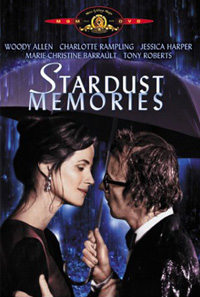 Woody Allen’s most controversial film was hated by fans upon its release for its narcissism and disregard towards his loyalists, but time has made Stardust Memories a much more entertaining film than it was considered in 1980. It blatantly references Federico Fellini’s 8 ½, in both plot (a respected filmmaker trying to clear his mind while dealing with fans and women) and its look (shot in beautiful black and white photography which, like Feliini, includes grotesque close-ups of all manner of odd looking people). Woody actually comes off as one of the beautiful people compared to the faces on the extras. Though Stardust Memories is funny, it’s also deeply depressing. Woody plays Sandy Bates, maybe his most confident character, and though always surrounded by admirers, he may also be his loneliest.
Woody Allen’s most controversial film was hated by fans upon its release for its narcissism and disregard towards his loyalists, but time has made Stardust Memories a much more entertaining film than it was considered in 1980. It blatantly references Federico Fellini’s 8 ½, in both plot (a respected filmmaker trying to clear his mind while dealing with fans and women) and its look (shot in beautiful black and white photography which, like Feliini, includes grotesque close-ups of all manner of odd looking people). Woody actually comes off as one of the beautiful people compared to the faces on the extras. Though Stardust Memories is funny, it’s also deeply depressing. Woody plays Sandy Bates, maybe his most confident character, and though always surrounded by admirers, he may also be his loneliest.
Like Allen himself, Sandy is a beloved maker of comedies who longs to get more philosophical and serious in his work. While attending a film retrospective weekend of his work, he is bombarded by sycophant fans; every couple of minutes someone seems to be asking for his autograph or his attention for their cause or script idea or just heaping praise on him. Time jumps back and forth from the beachfront festival to his New York apartment, while past and present relationships are examined. He’s haunted by memories of his ex, Dorrie (the icy Charlotte Rampling), an insecure and possibly insane actress, and his current French girlfriend, Isobel (Marie-Christine Barrault from Eric Rohmer’s My Night at Maud’s), who maybe he loves, but isn’t in love with. Meanwhile he strikes-up a friendship with an Annie Hall esque sincere violinist (Jessica Harper of Suspiria, who also appeared in Allen’s earlier Love And Death) but she’s already involved with someone. Sandy is just never satisfied with what he has, his fantasy world and film world collide to make him even more maladjusted.
Murderous Maids
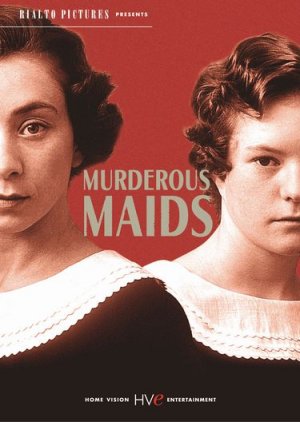 As stated in the previous review of Sister My Sister, Murderous Maids is a biopic on the Papin sisters. I listed the flaws of the former, and surprisingly found few to no flaws in this production. Alluding to the various interpretations of the sisters' lives, this film is more complete due to the fact that it goes into their childhood and background as maids, beginning with the convent where they were raised and educated. There's a hefty age difference between the two, and Christine is shattered when her mother informs her that her father, who's away at war, raped their older sister Emilia, who later became a nun. When the young Christine, who is also very religious, expresses her desire to also be a nun, her mother revolts out of spite, telling the child she would be a servant like her.
As stated in the previous review of Sister My Sister, Murderous Maids is a biopic on the Papin sisters. I listed the flaws of the former, and surprisingly found few to no flaws in this production. Alluding to the various interpretations of the sisters' lives, this film is more complete due to the fact that it goes into their childhood and background as maids, beginning with the convent where they were raised and educated. There's a hefty age difference between the two, and Christine is shattered when her mother informs her that her father, who's away at war, raped their older sister Emilia, who later became a nun. When the young Christine, who is also very religious, expresses her desire to also be a nun, her mother revolts out of spite, telling the child she would be a servant like her.
While Lea (Julie-Marie Paramentier) was still in school the adult Christine (Sylvie Testud) slaved away in various households as her mother collected most of the earnings and found her new positions. When Lea became a teenager her mother put her to work as well, and Christine's protests to this were due to the fact that she wanted a better life for her and because Lea informed her that the men in the current house she worked at took certain liberties with her and their mother. When their mother informs them that she plans to find work for them in the same household, the two are very pleased. They learn how the place works and do a splendid job until the volatile Christine ruins it and they're back at square one. She's forced to split from her sister, who she has a sexual attachment to, and finds work alone in a wonderful estate with a fairly nice woman and her adult daughter.
Lady Vengeance
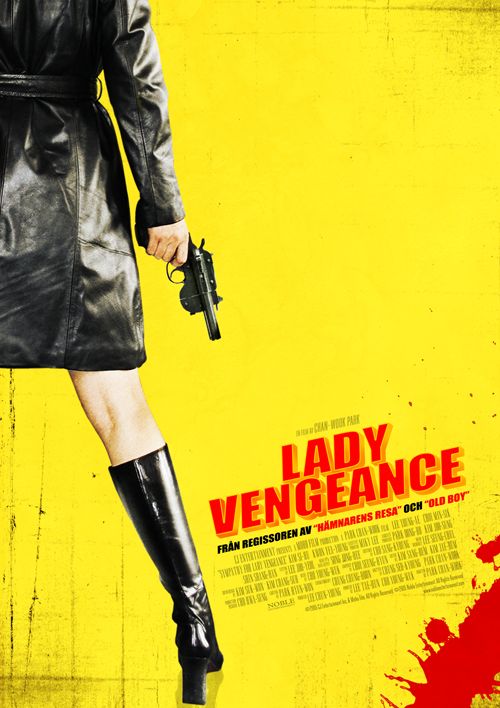 "Everyone makes mistakes. But if you sin, you have to make atonement for it...Big atonement for big sins. Small atonement for small sins."
"Everyone makes mistakes. But if you sin, you have to make atonement for it...Big atonement for big sins. Small atonement for small sins."
—Geum-ja's (played by Yeong-ae Lee) words to her young daughter Jenny serve as an emotional lesson in morality from Chan-wook Park's 2005 Lady Vengeance.
Sister My Sister
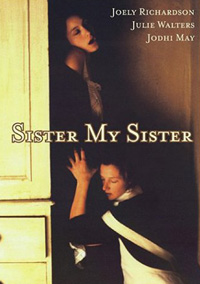 Lately I've been stuck in a cycle of comparability within mediums, mainly in terms of literature and film. History itself is interesting to me for that very reason. Depending on who won or lost a war, for example, we can be given two entirely different perspectives on that war's history. Biographies and biopics do the same, which brings me to the different perspectives in film and theory on the Papin sisters—two French chambermaids in the '30s who carried out an atrocious crime that shocked a nation. Their lives, and the crime in question, has been of interest to both psychoanalysts and social theorists, yet given the facts and testimonies during their trial, each person comes away with a different motive.
Lately I've been stuck in a cycle of comparability within mediums, mainly in terms of literature and film. History itself is interesting to me for that very reason. Depending on who won or lost a war, for example, we can be given two entirely different perspectives on that war's history. Biographies and biopics do the same, which brings me to the different perspectives in film and theory on the Papin sisters—two French chambermaids in the '30s who carried out an atrocious crime that shocked a nation. Their lives, and the crime in question, has been of interest to both psychoanalysts and social theorists, yet given the facts and testimonies during their trial, each person comes away with a different motive.
On one hand you've got doctors and historians approaching the sisters within the context of class, in fact calling their actions a class-crime—no more than two underpaid, often humiliated, servants in a harsh class system who took out their rage on their employer and her daughter by murdering them. This theory touches on the assumption that the two were lovers from a broken home, but only as a side note. They consider the slaying premeditated. The opposing outlook deals almost entirely with their sexual identity, sexual relationship with each other, and their disturbing family life. Here theorists make the claim that the two were mentally disturbed, that there could have been unreported instances of sexual abuse, and that the crime was one of passion, or at the very least of a sexual construct. The two films that I've discovered that chronicle their lives best are Murderous Maids, a French production, and a British production, Sister My Sister.
All The President’s Men
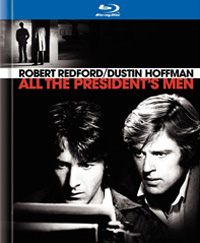 Watching the recent excellent documentary, Page One: Inside The New York Times, which questioned the potential end of print media and mature fact-based journalism, made me hanker to rewatch the greatest film about how journalists can seek the truth, and the standards and hoops they need to jump through in order to have their stories reported. Based on the true-story, autobiographical, political thriller by journalists Carl Bernstein and Bob Woodward, All The President’s Men details the young reporters' involvement in the Watergate scandal that worked its way through the cover-ups run by President Nixon’s staff, eventually reaching him and ending his presidency prematurely. All The President’s Men is a riveting account of the Watergate story from war zone reporters covering it, but today it’s also a reminder of the hard work and fact checking that goes into the coverage by these old dinosaurs, in this case the Washington Post, and the good that old media can sometimes bring to our democracy.
Watching the recent excellent documentary, Page One: Inside The New York Times, which questioned the potential end of print media and mature fact-based journalism, made me hanker to rewatch the greatest film about how journalists can seek the truth, and the standards and hoops they need to jump through in order to have their stories reported. Based on the true-story, autobiographical, political thriller by journalists Carl Bernstein and Bob Woodward, All The President’s Men details the young reporters' involvement in the Watergate scandal that worked its way through the cover-ups run by President Nixon’s staff, eventually reaching him and ending his presidency prematurely. All The President’s Men is a riveting account of the Watergate story from war zone reporters covering it, but today it’s also a reminder of the hard work and fact checking that goes into the coverage by these old dinosaurs, in this case the Washington Post, and the good that old media can sometimes bring to our democracy.
Aggressive young reporter Bob Woodward (Robert Redford) is put on the story of a small time, but suspicious burglary of the Democratic party headquarters at the Watergate Building in Washington DC. What makes the case more intriguing to Woodward and his superiors at the Washington Post is that the burglars all have pre-arranged high powered lawyers. He then discovers that the burglars have ties to the CIA and White House, meaning this wasn’t any old burglary; it was an attempt to bug the Democrats. Always poking his head in at the news room is the sloppier, but equally driven reporter, Carl Bernstein (Dustin Hoffman). He eventually gets himself teamed up with Woodward and as the two work to crack the case it continually takes them up the White House ladder all the way to President Nixon (“Tricky Dick”).
King of the Gypsies
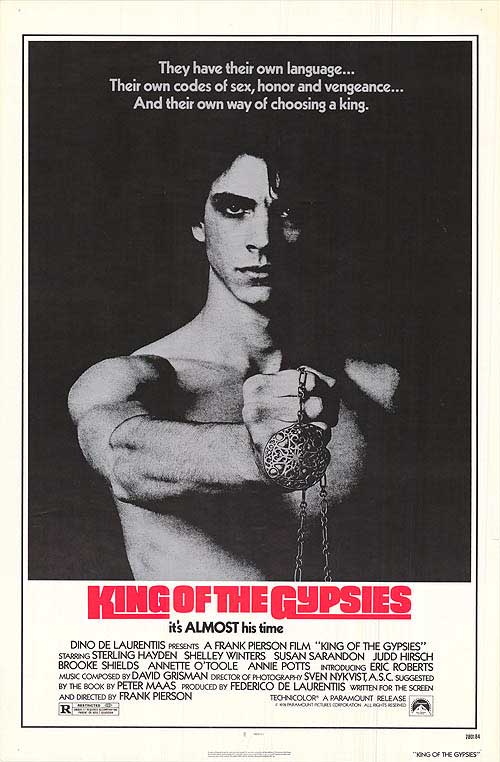 Due to a lack of high quality competition, King of the Gypsies is still the quintessential American fiction film about modern day gypsies, that is if you're old enough to think of 1978 as “modern day” (while the best non-fiction flick has to be Robert Duvall’s little seen documentary Angelo My Love). Based on a novel by Peter Maas (Serpico), King of the Gypsies reeks of importance and epic pretensions; but besides the cultural curiosity what actually makes the movie worthwhile and totally entertaining is the ham fisted act-off going on up on the screen. From Elia Kazan’s Streetcar Named Desire to Clint Eastwood’s Mystic River there’s a long tradition of method acting emoters chewing scenery and King of the Gypsies has its share of hungry thespians eager to chew. Heading the cast in his film debut the young pretty-boy Eric Roberts, pouting and brooding (but even under a teary-eyed tortured sulk the guy has chops and acts up a storm), doing what he can to keep up with his co-stars Susan Sarandon and Judd Hirsch who are totally over the top, with legendary ultra-hams Sterling Hayden and Shelly Winters nipping at their heels. Any film where Michael V. Gazzo (Frank Pentangeli in the Godfather: Part II) is an example of restraint in his one early scene, you know this is going to be some histrionic fun.
Due to a lack of high quality competition, King of the Gypsies is still the quintessential American fiction film about modern day gypsies, that is if you're old enough to think of 1978 as “modern day” (while the best non-fiction flick has to be Robert Duvall’s little seen documentary Angelo My Love). Based on a novel by Peter Maas (Serpico), King of the Gypsies reeks of importance and epic pretensions; but besides the cultural curiosity what actually makes the movie worthwhile and totally entertaining is the ham fisted act-off going on up on the screen. From Elia Kazan’s Streetcar Named Desire to Clint Eastwood’s Mystic River there’s a long tradition of method acting emoters chewing scenery and King of the Gypsies has its share of hungry thespians eager to chew. Heading the cast in his film debut the young pretty-boy Eric Roberts, pouting and brooding (but even under a teary-eyed tortured sulk the guy has chops and acts up a storm), doing what he can to keep up with his co-stars Susan Sarandon and Judd Hirsch who are totally over the top, with legendary ultra-hams Sterling Hayden and Shelly Winters nipping at their heels. Any film where Michael V. Gazzo (Frank Pentangeli in the Godfather: Part II) is an example of restraint in his one early scene, you know this is going to be some histrionic fun.
A New York and Pennsylvania gypsy clan is led by Zharko (Hayden); he claims to live like a millionaire who’s never done an honest day’s work in his life. The nomadic gypsies live without birth certificates, driver’s licenses, or paying taxes; they are proud criminals, scam artists, thieves, card sharks, insurance frauders and phony fortunetellers and by the late ‘70s they’ve settled in NYC where the real action is. Zharko’s son Groffo (Hirsch), the heir to the king, is considered a joke of a man; he’s a gambler and abusive to his wife Rose (Sarandon), who is the real talent in the family when it comes to the con. Zharko is dying and wants to skip his son and pass the leadership to his grandson Dave (Roberts), which has Groffo in a snit. The problem is Dave, like Michael in The Godfather, has ambitions to break away from the family and become a model citizen; he even has a non-gypsy girlfriend, Sharon (Annette O’Toole, in this era a go-to actress for all-American girlfriend roles). Under Zharko’s orders Dave is lured back to the family to protect his little sister Tita—
Down by Law
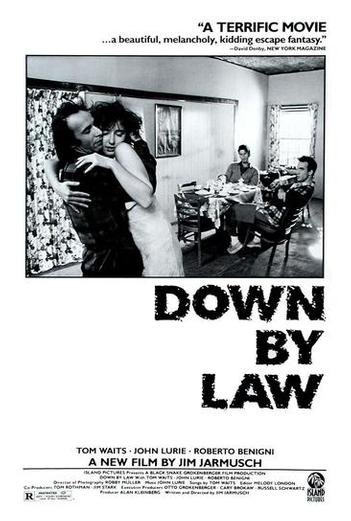 "I am no criminal. I am a good egg. We are. We are a good egg."
"I am no criminal. I am a good egg. We are. We are a good egg."
—With this, the bouncing Roberto Benigni's "Bob" brings his two new friends together in Jim
Husbands
.jpg) "Like I've been telling my wife for years: 'Aside from sex,’ and she's very good at it, goddammit, 'I like you guys better.' I really do."
"Like I've been telling my wife for years: 'Aside from sex,’ and she's very good at it, goddammit, 'I like you guys better.' I really do."
—So proclaims Harry, brazenly played by Ben Gazzara in Husbands. This bromantic refrain of love for his two friends characterizes the crass, yet affectionate honesty of John Cassavetes's 1970 comedy about life, death, and freedom.
The Wild Bunch
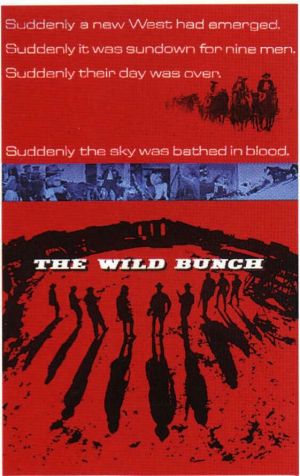 As the western genre in America became more and more watered down by television, Sam Peckinpah singlehandedly turned the western on its head; his The Wild Bunch shocked 1969 audiences with its almost apocalyptic, misogynistic, and violent vision of a dying era. By today’s standards The Wild Bunch is still a nihilistic masterpiece. The action and graphic carnage on screen are still staggering and utterly exciting. And along with Battleship Potemkin, Psycho, and Bonnie and Clyde, it’s still one of the gold standards for incredible cutting-edge editing of violence and death. The film is bookended by two of the best pieces of choreographed mayhem ever put to screen where the Bunch engage in shootouts so violent and intense that the film got an X rating then and even got an NC-17 rating when it was re-released in the ‘90s (both ratings were negotiated down by the studios). The editing and mix of film speeds, including slow motion, have been ripped off and become a standard in operatic action scenes since—just check out all of John Woo’s best (Hong Kong) films; they’re direct grandchildren of The Wild Bunch.
As the western genre in America became more and more watered down by television, Sam Peckinpah singlehandedly turned the western on its head; his The Wild Bunch shocked 1969 audiences with its almost apocalyptic, misogynistic, and violent vision of a dying era. By today’s standards The Wild Bunch is still a nihilistic masterpiece. The action and graphic carnage on screen are still staggering and utterly exciting. And along with Battleship Potemkin, Psycho, and Bonnie and Clyde, it’s still one of the gold standards for incredible cutting-edge editing of violence and death. The film is bookended by two of the best pieces of choreographed mayhem ever put to screen where the Bunch engage in shootouts so violent and intense that the film got an X rating then and even got an NC-17 rating when it was re-released in the ‘90s (both ratings were negotiated down by the studios). The editing and mix of film speeds, including slow motion, have been ripped off and become a standard in operatic action scenes since—just check out all of John Woo’s best (Hong Kong) films; they’re direct grandchildren of The Wild Bunch.
The legend of director Sam Peckinpah has taken on mythical proportions; he was a man out of time, a hard drinkin’ visionary with a death wish. One fact is definitely true: he was an ex-TV western director trying to find a place in features. His Ride the High Country was considered a little gem while the financial disaster and critical drubbing of Major Dundee almost ended his film career (a half-century later, it’s now deservingly considered an outstanding film). With Waylon Green (director of crazy killer insect cult flick The Hellstrom Chronicle), Peckinpah wrote the perfect vehicle to truly strut his romantically ugly version of the end of the Old West.











